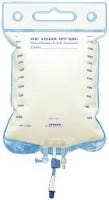Early parenteral nutrition does not improve survival

Early Parenteral Nutrition (TPN) Didn't Save Lives
Under the high stress of critical illness, people lose fat and muscle quickly. Obesity appears to be protective during critical illness, possibly because those extra fat reserves come in handy during this period of accelerated catabolism. The strong physiological rationale and the psychological pressure not to appear to be starving people make providing nutrition as early as possible to patients in the ICU a standard practice. If a patient can't tolerate enteral liquid feedings via a tube, her doctors frequently start parenteral nutrition, also called total parenteral nutrition or TPN. A 2005 meta-analysis of 11 studies suggested a reduction in mortality among those given early parenteral nutrition. However, infection rates were also increased among those getting parenteral nutrition. Since the trials were so small individually, the global expertocracy was divided on how to react to these conflicting findings. The Europeans advised starting parenteral nutrition within 24-48 hours after enteral feedings fail, while the Americans recommended starvation for 7-14 days before starting TPN. After those guidelines sailed, a huge trial (n=4,640) published in NEJM in 2011 showed no benefit and potential harm from providing TPN at day 3, rather than day 8 of failing enteric feeds. A large observational trial also showed no difference in outcomes among those given early vs. late nutrition. Enter Gordon S. Doig et al with the ANZICS group, who add to this evolving controversy with the results of the Early PN Trial, published in the May 2013 online JAMA.
What They Did
Investigators enrolled 1,372 patients from 27 centers on ICU day 1-2 who could not receive enteral nutrition to receive either parenteral nutrition more or less immediately (within ~44 minutes), plus vitamin and mineral infusions, or to receive standard care (the study was unblinded). Standard care was at the discretion of the attending, and at the end, it had included:
No enteral or parenteral nutrition at all (41% of patients)
Some enteral nutrition at some point, but no parenteral nutrition (44%). Notably, these patients were kept NPO average of 3 days before receiving any enteral nutrition.
Parenteral nutrition, started in 27% as initial nutrition after 2 days of starvation, and in others ~5 day eventually started after ~5.5 days (24%)
Parenteral nutrition patients got an average 6 days of TPN and were able to get 3 days of enteral nutrition. The parenteral group received much more calories and achieved "goals" for protein and caloric intake much more often. No sugar water infusions were provided to either group as substitute nutrition. All patients received insulin drips if blood glucose rose above 180 mg/dL. Mortality on day 60 was the primary outcome; numerous prespecified secondary outcomes were measured. They calculated they had 90% power to find a 7.7% mortality risk difference (but fell 100 subjects short of their target of 1,470, for lack of funding).
What They Found
There was no difference in 60-day mortality between groups (22.8% vs. 21.5%). Patients receiving parenteral nutrition were freed from mechanical ventilation about a day sooner, on average. However, they did not leave the ICU or the hospital any sooner. There were no differences between groups in the rates of new infections, nor any adverse events attributed to parenteral nutrition. Authors were meticulous at recording and characterizing infections. Those in the standard therapy group were perceived to have more fat loss and muscle wasting by investigators (by subjective global assessment). However, there were no significant differences in global functioning or quality-of-life at 60 days after enrollment (by RAND-36 scores).
What It Means
There's a little something in the Early PN Trial for everyone: The faster observed weaning from mechanical ventilation, lack of excess infection risk, and suggestion of muscle mass preservation will encourage parenteral nutrition advocates to continue starting TPN on their enteral-feeding-intolerant patients early and often. Minimalists and skeptics of parenteral nutrition can combine the Early PN Trial with the previous large TPN trial in NEJM, along with observational data, say "See--no benefit from early TPN," and feel comfortable providing the minimal tolerated enteral feedings during a patient's critical illness. For patients with ARDS, physicians can also cite the EDEN trial's finding of no adverse effects of providing trophic enteral feeds only (as compared to full enteral feeding) for six days. TPN skeptics should also point out that 41% of the standard-care group received no nutrition at all for their whole ICU stay (~4 days), and the patients who were fed waited 2 days or more before getting any nutrition. This was per their attendings' NPO orders, often post-gastrointestinal surgery, although there is evidence that starting enteral feeding soon after GI surgery reduces mortality. Should this standard-care subgroup have been fed earlier, and would that have made TPN look worse? In terms of applicability, few ICUs can currently initiate TPN within an hour of a doctor's order; it's usually later that day or the next. Whether those hours would make a difference is anyone's guess.

Clinical Takeaway: Start enteral feedings early -- and question your belief that the patient isn't ready for them. Whether using total parenteral nutrition in patients' first week of intolerance of enteral nutrition is helpful or ill-advised remains about as clear as the milky fluid in the bag.
[polldaddy poll=7243368]
Gordon S. Doig. Early Parenteral Nutrition in Critically Ill Patients With Short-term Relative Contraindications to Early Enteral Nutrition: A Randomized Controlled Trial. JAMA. 2013;309(20):2130-2138.


